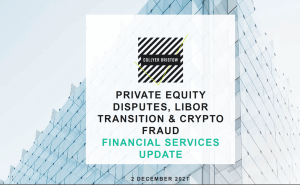- Banking & financial disputes
- Financial services
- Financial services

Longer Reads
ESG: The new FCA Anti-Greenwashing and Sustainability Rules
The FCA are introducing new rules and guidance on anti-greenwashing and sustainability, with the anti-greenwashing rule due to come into effect very shortly on 31st May.
4 minute read
Published 29 May 2024
Key information
- Specialisms
- Dispute Resolution
- Sectors
- Financial services
Background
The new rules stemmed from the FCA’s concerns surrounding customers being able to make informed decisions about products which would meet their sustainability preferences. It has become very common for consumers (both individuals and companies) to factor in ESG and sustainability when deciding which products and services to purchase. The FCA’s research actually found that over 80% of consumers want their money to ‘do good’ as well as deliver a return.
But how products and services are labelled across the market, and how valid those labels are, is often unclear or inconsistent. The level of access to information surrounding the sustainability of products and services was also of concern to the FCA.
And that is the key rationale behind the new anti-greenwashing rule – namely to ensure that any sustainability-related claims made by firms about their products and services are fair, clear and not misleading. The FCA can then use this rule as a basis to challenge firms if it considers they are making misleading sustainability-related claims.
The anti-greenwashing rule
The anti-greenwashing rule applies when a firm:
- communicates with clients in the UK in relation to a product or service; or
- communicates a financial promotion (or approves a financial promotion for communication) to a person in the UK.
- where there is reference to sustainability characteristics – environmental and/ or social – of a product or service.
The greenwashing rule applies to firms irrespective of whether they are subject to the Consumer Duty. But those who are subject to the Consumer Duty will need to do things such as testing their communications and monitoring customer outcomes.
Similarly to what we have found when discussing the new Consumer Duty rule which came into force on 31st July 2023, it is not entirely clear yet what the new anti-greenwashing rule looks like in practice. In fact, the main area of feedback following the consultation which closed on 26th January related to examples given and requests for further clarity on the FCA’s expectations.
In-keeping with the usual FCA messaging of ‘use your own judgment’, the final report does include some further guidance but says “Firms may consider the guidance as appropriate, depending on the nature of their business and the sustainability-related claims they make”.
But this new rule shouldn’t be too significant a shift, given the FCA Handbook already required most firms to ensure that any information they communicated is fair, clear and not misleading. This new anti-greenwashing rule is intended to complement these existing rules.
The guidance, in theory, should be straightforward to apply. For a sustainability claim to be fair, clear and not misleading in accordance with the anti-greenwashing rule, it should be:
- correct and capable of being substantiated
- clear and presented in a way that can be understood
- complete – the firm should not omit or hide important information and should consider the full life-cycle of the product or service
- and finally, comparisons to other products or services should be fair and meaningful
In essence, give consumers the full picture in a way they will understand, and make sure it’s accurate.
A package of measures
The new anti-greenwashing rule only forms one part of a wider package of measures which are set out in the FCA’s new Sustainability Disclosure Requirements and investment labels regime.
The anti-greenwashing rule applies to all FCA-authorised firms who make sustainability-related claims about products and services, but the FCA have also introduced:
- investment labels, disclosure and naming and marketing rules that apply to UK asset managers; and
- targeted rules that apply to distributors of investment products to retail investors in the UK
There are 4 new investment labels that the FCA has created – which firms can begin to use from 31 July 2024. These are:
1.Sustainability Focus – A minimum of 70% of that product’s assets must be consistent with an aim to invest in assets that are environmentally/socially sustainable, determined using a robust evidence-based standard that is an absolute measure of sustainability (and other assets must not conflict with this standard).
2.Sustainability Improvers – The sustainability objective must be consistent with an aim to invest in assets that have the potential to improve environmental/social sustainability over time, again determined using a robust evidence-based standard that is an absolute measure of sustainability.
3.Sustainability Impact – The sustainability objective must be consistent with an aim to achieve a pre-defined positive measurable impact in relation to an environmental/social outcome. (This for example would be products investing in solutions to problems affecting people or the planet)
4.Sustainability Mixed Goals – A combination of the first 3 labels. (the supporting disclosure in this case must state the proportion of assets invested in accordance with each of those labels)
There is no hierarchy between the labels; one is not considered to be ‘better’ than another in the FCA’s eyes. They are instead designed to help inform customer decisions when investing, and so it will be up to the customer to determine which label most closely aligns with their goals / values.
There is no definition of ‘absolute measure’, but the guidance indicates the FCA expect robust evidence-based disclosure, whereby firms use a methodology/approach that is based on that of an authoritative body (such as a regulator) or industry practice. A key factor seems to be that the chosen measure and supporting disclosure must be able to withstand scrutiny.
The disclosures
There are also disclosure requirements to evidence the fact that your product/service meets the criteria of the label you have attached to it.
The disclosures are:
1.Consumer-facing disclosures
2.Pre-contractual disclosures
3.Ongoing product-level disclosures
4.Entity-level disclosures
We will be focussing upon consumer-facing disclosures, as that stems directly from the wider concerns that we highlighted at the start of this article.
Firms will be expected to produce, in a new standalone document that is separate to the usual key investor information, a summary of the product’s key sustainability characteristics. This applies to products with one of the four labels, but also to those without labels where sustainability-related terms are used to promote them.
There is no set template for the consumer-facing disclosures, but there are key features that must be included:
- It must be located in a prominent place on the relevant digital medium through which the product is offered, and hardcopies must be made available on request
- It must confirm the product’s sustainability objective and label, or clarity that it doesn’t have a label
- It must set out details of the investment policy and strategy, including what the product will / won’t invest in
- It must set out the relevant metrics used to measure this
All consumer-facing disclosures must be reviewed and updated annually as appropriate. And where the product does have a label, any such updates should reflect the progress towards achieving the sustainability objective.
What is the timeline?
It is a broad package of measures (the final policy statement is 212 pages!).
In terms of a timeline:
- 31 May 2024 – Anti-greenwashing rule come into force
- 31 July 2024 – Firms can begin to use labels, with accompanying disclosures
- 2 December 2024 – Naming and marketing rules come into force, with accompanying disclosures
- 2 December 2025 – Ongoing product-level and entity-level disclosures for firms with AUM > £50bn
- 2 December 2026 – Entity-level disclosure rules extended to firms with AUM > £5bn
Those who are likely to be impacted by these new rules need to ensure they understand at least the more immediate elements first, but also need to remain conscious of the subsequent developments so they can get ahead of the game.
All of the guidance we have mentioned in this article can be found on the FCA website. For more information, please visit our Banking & Financial Disputes Lawyers page. And of course, if you need any advice, please do not hesitate to reach out to our team.
Related content
Longer Reads
ESG: The new FCA Anti-Greenwashing and Sustainability Rules
The FCA are introducing new rules and guidance on anti-greenwashing and sustainability, with the anti-greenwashing rule due to come into effect very shortly on 31st May.
Published 29 May 2024
Associated sectors / services
Authors
Background
The new rules stemmed from the FCA’s concerns surrounding customers being able to make informed decisions about products which would meet their sustainability preferences. It has become very common for consumers (both individuals and companies) to factor in ESG and sustainability when deciding which products and services to purchase. The FCA’s research actually found that over 80% of consumers want their money to ‘do good’ as well as deliver a return.
But how products and services are labelled across the market, and how valid those labels are, is often unclear or inconsistent. The level of access to information surrounding the sustainability of products and services was also of concern to the FCA.
And that is the key rationale behind the new anti-greenwashing rule – namely to ensure that any sustainability-related claims made by firms about their products and services are fair, clear and not misleading. The FCA can then use this rule as a basis to challenge firms if it considers they are making misleading sustainability-related claims.
The anti-greenwashing rule
The anti-greenwashing rule applies when a firm:
- communicates with clients in the UK in relation to a product or service; or
- communicates a financial promotion (or approves a financial promotion for communication) to a person in the UK.
- where there is reference to sustainability characteristics – environmental and/ or social – of a product or service.
The greenwashing rule applies to firms irrespective of whether they are subject to the Consumer Duty. But those who are subject to the Consumer Duty will need to do things such as testing their communications and monitoring customer outcomes.
Similarly to what we have found when discussing the new Consumer Duty rule which came into force on 31st July 2023, it is not entirely clear yet what the new anti-greenwashing rule looks like in practice. In fact, the main area of feedback following the consultation which closed on 26th January related to examples given and requests for further clarity on the FCA’s expectations.
In-keeping with the usual FCA messaging of ‘use your own judgment’, the final report does include some further guidance but says “Firms may consider the guidance as appropriate, depending on the nature of their business and the sustainability-related claims they make”.
But this new rule shouldn’t be too significant a shift, given the FCA Handbook already required most firms to ensure that any information they communicated is fair, clear and not misleading. This new anti-greenwashing rule is intended to complement these existing rules.
The guidance, in theory, should be straightforward to apply. For a sustainability claim to be fair, clear and not misleading in accordance with the anti-greenwashing rule, it should be:
- correct and capable of being substantiated
- clear and presented in a way that can be understood
- complete – the firm should not omit or hide important information and should consider the full life-cycle of the product or service
- and finally, comparisons to other products or services should be fair and meaningful
In essence, give consumers the full picture in a way they will understand, and make sure it’s accurate.
A package of measures
The new anti-greenwashing rule only forms one part of a wider package of measures which are set out in the FCA’s new Sustainability Disclosure Requirements and investment labels regime.
The anti-greenwashing rule applies to all FCA-authorised firms who make sustainability-related claims about products and services, but the FCA have also introduced:
- investment labels, disclosure and naming and marketing rules that apply to UK asset managers; and
- targeted rules that apply to distributors of investment products to retail investors in the UK
There are 4 new investment labels that the FCA has created – which firms can begin to use from 31 July 2024. These are:
1.Sustainability Focus – A minimum of 70% of that product’s assets must be consistent with an aim to invest in assets that are environmentally/socially sustainable, determined using a robust evidence-based standard that is an absolute measure of sustainability (and other assets must not conflict with this standard).
2.Sustainability Improvers – The sustainability objective must be consistent with an aim to invest in assets that have the potential to improve environmental/social sustainability over time, again determined using a robust evidence-based standard that is an absolute measure of sustainability.
3.Sustainability Impact – The sustainability objective must be consistent with an aim to achieve a pre-defined positive measurable impact in relation to an environmental/social outcome. (This for example would be products investing in solutions to problems affecting people or the planet)
4.Sustainability Mixed Goals – A combination of the first 3 labels. (the supporting disclosure in this case must state the proportion of assets invested in accordance with each of those labels)
There is no hierarchy between the labels; one is not considered to be ‘better’ than another in the FCA’s eyes. They are instead designed to help inform customer decisions when investing, and so it will be up to the customer to determine which label most closely aligns with their goals / values.
There is no definition of ‘absolute measure’, but the guidance indicates the FCA expect robust evidence-based disclosure, whereby firms use a methodology/approach that is based on that of an authoritative body (such as a regulator) or industry practice. A key factor seems to be that the chosen measure and supporting disclosure must be able to withstand scrutiny.
The disclosures
There are also disclosure requirements to evidence the fact that your product/service meets the criteria of the label you have attached to it.
The disclosures are:
1.Consumer-facing disclosures
2.Pre-contractual disclosures
3.Ongoing product-level disclosures
4.Entity-level disclosures
We will be focussing upon consumer-facing disclosures, as that stems directly from the wider concerns that we highlighted at the start of this article.
Firms will be expected to produce, in a new standalone document that is separate to the usual key investor information, a summary of the product’s key sustainability characteristics. This applies to products with one of the four labels, but also to those without labels where sustainability-related terms are used to promote them.
There is no set template for the consumer-facing disclosures, but there are key features that must be included:
- It must be located in a prominent place on the relevant digital medium through which the product is offered, and hardcopies must be made available on request
- It must confirm the product’s sustainability objective and label, or clarity that it doesn’t have a label
- It must set out details of the investment policy and strategy, including what the product will / won’t invest in
- It must set out the relevant metrics used to measure this
All consumer-facing disclosures must be reviewed and updated annually as appropriate. And where the product does have a label, any such updates should reflect the progress towards achieving the sustainability objective.
What is the timeline?
It is a broad package of measures (the final policy statement is 212 pages!).
In terms of a timeline:
- 31 May 2024 – Anti-greenwashing rule come into force
- 31 July 2024 – Firms can begin to use labels, with accompanying disclosures
- 2 December 2024 – Naming and marketing rules come into force, with accompanying disclosures
- 2 December 2025 – Ongoing product-level and entity-level disclosures for firms with AUM > £50bn
- 2 December 2026 – Entity-level disclosure rules extended to firms with AUM > £5bn
Those who are likely to be impacted by these new rules need to ensure they understand at least the more immediate elements first, but also need to remain conscious of the subsequent developments so they can get ahead of the game.
All of the guidance we have mentioned in this article can be found on the FCA website. For more information, please visit our Banking & Financial Disputes Lawyers page. And of course, if you need any advice, please do not hesitate to reach out to our team.
Associated sectors / services
- Banking & financial disputes
- Financial services
- Financial services
Authors
Need some more information? Make an enquiry below.
Subscribe
Please add your details and your areas of interest below
Article contributors
Robin
HenryPartner - Head of Dispute Resolution Services
Specialising in Banking & financial disputes, Commercial disputes, Corporate recovery, restructuring & insolvency, Financial regulatory, Financial Services and Personal insolvency
Enjoy reading our articles? why not subscribe to notifications so you’ll never miss one?
Subscribe to our articlesMessage us on WhatsApp (calling not available)
Please note that Collyer Bristow provides this service during office hours for general information and enquiries only and that no legal or other professional advice will be provided over the WhatsApp platform. Please also note that if you choose to use this platform your personal data is likely to be processed outside the UK and EEA, including in the US. Appropriate legal or other professional opinion should be taken before taking or omitting to take any action in respect of any specific problem. Collyer Bristow LLP accepts no liability for any loss or damage which may arise from reliance on information provided. All information will be deleted immediately upon completion of a conversation.
Close










































































